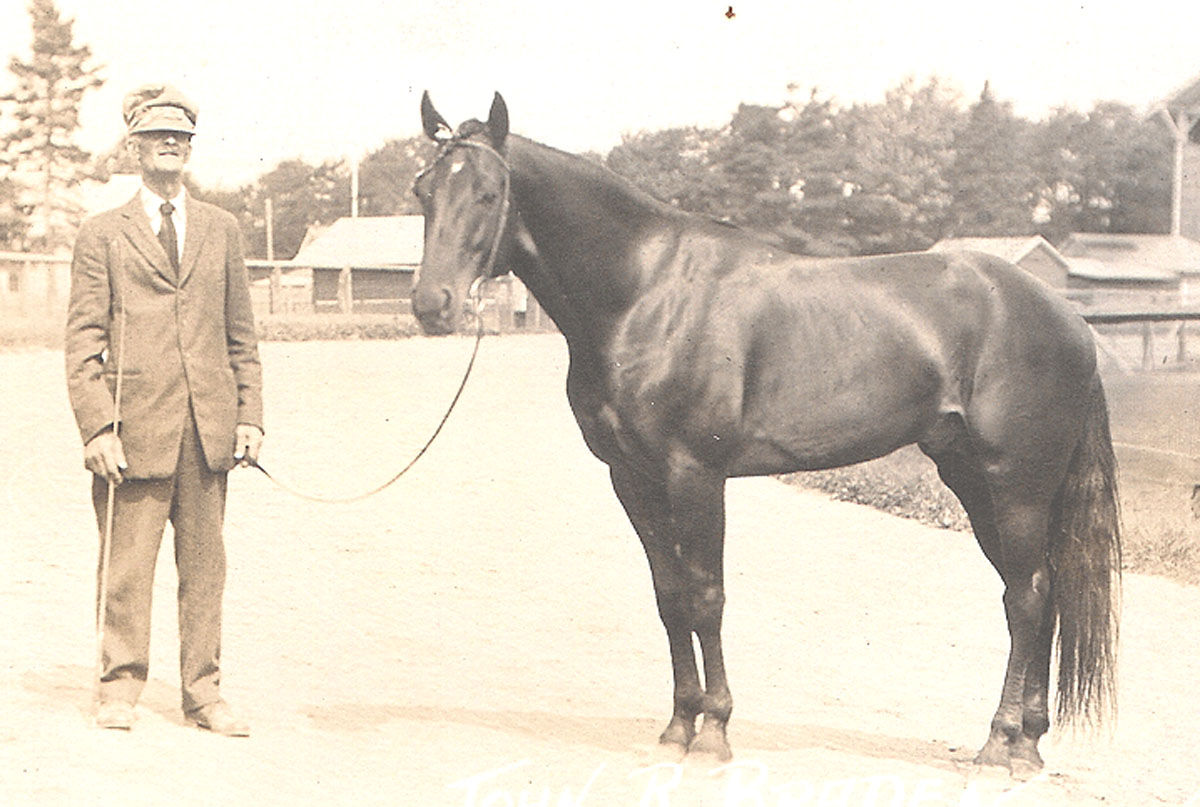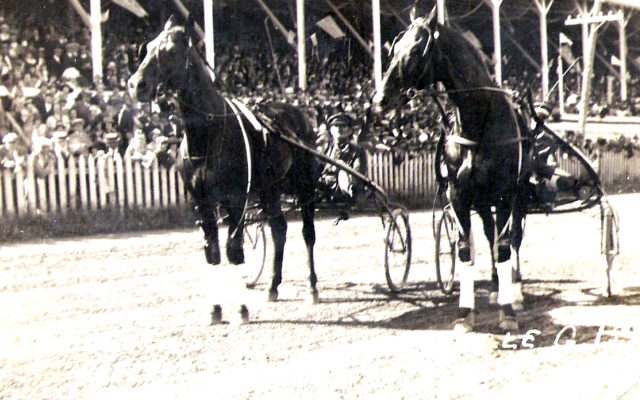
PRESQUE ISLE, Maine — These days, the Braden Theater in Presque Isle is well known for playing the latest blockbuster movies, but what many might not know is that it was named after a racehorse that once was the city’s greatest pride.
For decades after 1868, when the Presque Isle Trotting Park Association began renting its circular racetrack to the Northern Maine Fair Association, harness racing was a mainstay tradition during the annual summer fair here. And the 1920s were the most popular period for the sport in Maine and the Maritime Provinces of Canada.
During that time, harness racing was so popular in northern Maine that there were individual racetracks in Van Buren, Ashland, Caribou, Fort Fairfield and Presque Isle, and three tracks in Houlton. In 1921, a group of businessmen, farmers and horsemen in Presque Isle who belonged to the Mooseleuk Club took advantage of the sport’s popularity when they purchased a horse named John R Braden from Tennessee for $4,010.
By that time John R Braden had become known as a seasoned winner of races across the country and his skill on the track was something in which the Mooseleuk Club saw potential, according to Stephen Thompson of Hallowell, who has conducted research on the state’s trotting parks for the online Lost Trotting Parks Heritage Center.
“He was a horse that wasn’t known for a single famous race but for his reputation,” Thompson said. “He inspired other people in Aroostook County to purchase racehorses to try to beat him.”
Throughout the four racing seasons in which John R Braden competed, including his time in Tennessee, he won 31 out of 68 races and became known in Aroostook County and Canada as “the horse to beat.” According to research published in the Maine Memory Network, the horse earned himself nicknames such as “The Little Iron Horse” and “Cock of the North” and won over $48,000 during his career. Much of his winnings were donated to local nonprofits and put into a bank account that the people of Presque Isle opened under his own name.
John R Braden became so well known in Presque Isle that people regarded him as a type of local celebrity. The horse was used as an endorser for The John R Braden Cigar. A pencil without an eraser was used to promote the cigar, with the catchphrase “You will make no mistake if you smoke The John R Braden Cigar. ‘It Can’t Be Beat.’”
Over the years there have been songs and poems written about John R Braden such as “The John R Braden March Song,” “A Ballad of ‘The Braden Hoss,’” as well as an untitled poem written after his death at age 17 on Nov. 29, 1929. The first lines of the poem read: “A horse we loved of famed renown / Has quietly, sadly left our town / A gentile stallion with flying mane / John R Braden was his name.”
John R Braden was so popular, noted Kim Smith, secretary and treasurer for the Presque Isle Historical Society, that people in town treated him quite literally as though he were one of them.
“The horse was so beloved that there were banquets held to celebrate him. During one of the banquets, he was actually brought into the hotel and fed champagne out of his trophy cup,” Smith said.
During his career, John R Braden had a solid team of people behind him, including driver John Willard, his groom George Thomas, farrier Bill Morrison, harness maker Oliver Hemphill and caretaker T.E. Fogg. He not only competed in Maine but also in the Maritime Provinces. In one of his most famous victories, he defeated world champion Margaret Dillon in three consecutive races at the Island Park Raceway in Woodstock, New Brunswick. The Maine Memory Network states that an estimated 25,000 watched those races.
Though John R Braden was known as a racer that was nearly impossible to beat, he most famously lost during a race against Single G, a world-famous racehorse bred and raised in Indiana, at the Northern Maine Fairgrounds on Sept. 3, 1925.
After his death, John R Braden was buried in a concrete vault built for him near the homestretch of the racetrack on the fairgrounds. Officials later moved him closer to The Forum after the track was expanded for tractor pulls and other events. A large granite stone comemerates both John R Braden and Willard.
The Braden Theater first opened in 1950 with more than 900 seats and was named after John R Braden due to the fact that two of the building’s four owners — Mark Tuner and George Barnes — were members of the Mooseleuk Club and wanted to honor the race horse’s memory. Competition from a new eight-screen theater near The Aroostook Centre Mall caused owners to close the theater in 1994. But father and son Arlen and Chris Dow re-opened the theater in 2009.
Although The Braden Theater holds it own history in Presque Isle, Thompson noted that the often forgotten stories of Aroostook County’s trotting parks and horses like John R Braden have unique value in the state’s history. That was something he found out firsthand while helping his cousin Clark Thompson of Bangor conduct research for the book “Maine’s Trotting Horse Heritage Trail.”
“I grew up in Limestone and I remember playing baseball at the field in Caribou and not knowing that part of that field was once a racetrack,” Thompson said. “At one point there were over 100 trotting parks in Maine, but it’s a history that I don’t think many younger folks know about.”
For more information about the story of John R Braden or trotting parks in Aroostook County, visit https://www.mainememory.net/ or https://losttrottingparks.blogspot.com/.
- The horse John R Braden (left) is pictured here after one of his rare defeats in harness racing on Sept. 3, 1925, at the Northern Maine Fairgrounds in Presque Isle. Single G, a racehorse from Indiana, defeated John R Braden that day. (Courtesy of Lost Trotting Parks Heritage Center)








